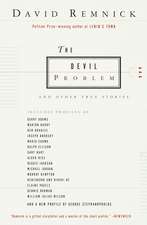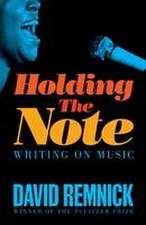Reporting
Autor David Remnicken Limba Engleză Paperback – 16 ian 2014
| Toate formatele și edițiile | Preț | Express |
|---|---|---|
| Paperback (2) | 114.51 lei 6-8 săpt. | |
| Vintage Books USA – 30 apr 2007 | 117.69 lei 3-5 săpt. | |
| PICADOR – 16 ian 2014 | 114.51 lei 6-8 săpt. |
Preț: 114.51 lei
Preț vechi: 131.63 lei
-13% Nou
Puncte Express: 172
Preț estimativ în valută:
21.91€ • 23.80$ • 18.41£
21.91€ • 23.80$ • 18.41£
Carte tipărită la comandă
Livrare economică 22 aprilie-06 mai
Preluare comenzi: 021 569.72.76
Specificații
ISBN-13: 9781447250821
ISBN-10: 1447250826
Pagini: 498
Dimensiuni: 156 x 234 x 30 mm
Greutate: 0.84 kg
Editura: PICADOR
ISBN-10: 1447250826
Pagini: 498
Dimensiuni: 156 x 234 x 30 mm
Greutate: 0.84 kg
Editura: PICADOR
Notă biografică
David Remnick has been the editor of The New Yorker since 1998. A staff writer for the magazine from 1992 to 1998, he was previously The Washington Post's correspondent in the Soviet Union. The author of several books, he was awarded the Pulitzer Prize and the George Polk Award for his 1994 book Lenin's Tomb. Mr. Remnick served as an Olympic Correspondent and Commentator for NBC during the Sochi 2014 Winter Olympics.He lives in New York with his wife and children.
Extras
The Wilderness Campaign:
Al Gore
Hey, Dwayne? . . . Dwayne?”
“Yes, Mr. Vice-President?”
“Could I have some more coffee?”
“Yes, Mr. Vice-President. Coming . . .”
“Thanks, Dwayne.”
It was ten in the morning in Nashville, a quiet weekday, with most of the neighbors off to work, and Albert Gore, Jr., sat at the head of his dining-room table eating breakfast. His plate was crowded with scrambled eggs, bacon, toast. His pond-size mug had, in a flash, been refilled by Dwayne Kemp, his cook, a skilled and graceful man who had been employed by the Gores when, as his boss often puts it, “we were still working in the White House.” Freshly showered and shaved, Gore was wearing a midnight-blue shirt and gray wool trousers. In the months after losing the battle for Florida’s electoral votes and conceding the Presidency to George W. Bush, on December 13, 2000, Gore seemed to let himself go, dropping out of sight, traveling around Spain, Italy, and Greece for six weeks with his wife, Tipper. He wore dark glasses and a baseball cap tugged down low. He grew a mountain-man beard and gained weight. When he began appearing in public again, mainly in classrooms, he took to introducing himself by saying, “Hi, I’m Al Gore. I used to be the next President of the United States.” People looked at this rather bulky and hirsute man—a politician who had only recently won 50,999,897 votes for the Presidency, more than any Democrat in history, more than any candidate in history except Ronald Reagan in 1984, and more than half a million more votes than the man who assumed the office—and did not know quite what to feel or how to behave, and so they cooperated in his elaborate self-deprecations. They laughed at his jokes, as if to help him erase what everyone understood to be a disappointment of historic proportions—“the heartbreak of a lifetime,” as Karenna, the eldest of his four children, put it. “You know the old saying,” Gore told one audience after another. “You win some, you lose some—and then there’s that little-known third category.”
Gore has since dispensed with the beard but not the weight. He is still thick around the middle. He eats quickly and thoroughly, and with a determined relish, precisely like a man who no longer has to care that he might look heavy on Larry King Live. “You want some eggs?” he asked. “Dwayne’s the best.”
This has been the first election season in a generation in which Al Gore has not pursued national office. He ran for President in 1988, when he was thirty-nine; for Vice-President, on Bill Clinton’s ticket, in 1992 and 1996; and then again for President in 2000. Having decided that a rematch against Bush would be too divisive (or, perhaps, too difficult), Gore has made an effort not to brood on the sidelines. Instead, he used words like “liberated” and “free” with a determined conviction to describe his inner condition. He was free of the burden, free of the pressure, free of the camera’s eye. At home in Nashville, the phone barely rang. There were no advance people at the door, no aides at his shoulder. He could say what he wanted and it hardly made a ripple in the media. If he felt like calling George Bush a “moral coward,” if he felt like comparing Guantánamo and Abu Ghraib to islands in an “American gulag” or the President’s media operatives to “digital Brown Shirts,” well, he just went ahead and did it. No worries, no hesitation. True, at noon at the Belcourt Theatre, he was to deliver a speech to a group called the Music Row Democrats, but the only cameras were likely to be local. He jokingly outlined the speech on a small notepad with just two words: “war” and “economy.”
When Al and Tipper Gore had recovered from the initial shock of the 2000 election, they spent $2.3 million on the house they live in now: a hundred-year-old colonial on Lynwood Boulevard, in the Belle Meade section of Nashville. They still own a place in Arlington, Virginia—a house that was built by Tipper’s grandfather—and a ninety-acre cattle farm in the Gore family seat of Carthage, Tennessee; but Arlington was perilously close to Washington, and Carthage was too remote for a full-time residence, especially for Tipper. Belle Meade, which resembles Buckhead, in Atlanta, or Mountain Brook, near Birmingham, is a prosperous redoubt for businessmen and country-music stars; it encompasses a neighborhood of broad, sloping lawns, and houses with magnolia trees and “estate” driveways up front and glassy modern additions and swimming pools out back. Chet Atkins used to be a neighbor; Leon Russell still is. Some of the features of the house, which the couple expanded with the help of an architect, are distinctly Gore-ish: Tipper’s full drum set, in the living room (complete with congas); Al’s grip-and-grin photographs with the Clintons and world leaders, along the walls. There are fewer books and more televisions than you might expect. When the architect was designing the rear addition to the house, Gore asked him to curve the walls inward in two places in order to save several trees. “The trees weren’t anything special, nothing rare or anything,” he said. “I just couldn’t bear to bring ’em down.” In the backyard, around the patio and the extra-long pool, where Al and Tipper do laps, Gore also installed an anti-bug system that sprays a fine mist of ground chrysanthemums from various discreet sources: a tree trunk, a patio wall. “The mosquitoes just hate it,” he said. Other features of the house are less environmentally correct. A 2004 black Cadillac, which Gore drives, was parked in the driveway. A ’65 Mustang—a Valentine’s Day gift from Al to Tipper—was parked in the garage.
Gore finished his eggs. He walked to a covered patio on the side of the house and settled into a soft chair. Dwayne brought his coffee cup and refilled it.
Gore has hardly been a recluse since deciding, in late 2002, not to run again. In the past year, he has delivered a series of speeches in New York and Washington sharply criticizing the Bush Administration, but he has answered few questions. “It’s better that way for a while,” he said. He has given speeches for money all around the world. And he is teaching courses, mainly about the intersection of community and the American family, at Middle Tennessee State University, in Murfreesboro, and Fisk University, in Nashville.
“We’ve got about forty hours of lectures and classes on tape,” Gore said, deadpan. “Now’s your chance to watch them.”
Gore is beginning to make serious money. He is a board member for Apple and a senior adviser to Google, which just went through its IPO. He has also been working on creating a cable-television station and developing a financial enterprise.
“I’m having a blast,” he said.
In a parliamentary system, a candidate for Prime Minister, after losing an election, often returns to the party leadership or at least to a prominent seat in parliament. It doesn’t work that way in the United States. Here, you make your own way: you give speeches, write memoirs, accumulate a fortune, find a righteous cause. Sometimes a reporter might come calling, but not often. In any case, Donna Brazile, Gore’s campaign manager in 2000, said, “When it was over, the Democratic Party kicked him to the curb,” preferring to forget not only the Florida catastrophe but also Gore’s own misplays: his mutating personality in the three debates with Bush; his reliance on political consultants; his inability to exploit Bill Clinton’s enduring popularity and his failure to win Clinton’s Arkansas, much less Tennessee; his decision not to press immediately for a statewide recount in Florida. Now, everywhere he goes, Gore is faced with crowds who despair of the Bush Administration and see in him all that might have been, all the what-ifs. The heartbreak of a lifetime. Sometimes people approach him and address him as “Mr. President.” Some try to cheer him up and tell him, “We know you really won.” Some tilt their heads, affecting a look of grave sympathy, as if he had just lost a family member. He has to face not only his own regrets; he is forever the mirror of others’. A lesser man would have done far worse than grow a beard and put on a few pounds.
Consider the expectations: more than Franklin Roosevelt, or even John F. Kennedy, Gore was raised to be President. His father, Albert Gore, Sr., a senator who was known to look as noble as a Roman statesman, expected it of him. When Gore’s mother was pregnant with Al, Gore Senior told the editors of the Nashville Tennessean that if his wife gave birth to a boy he didn’t want to see the story tucked deep in the paper. After Al was born, the headline read, well, mr. gore, here he is, on page 1. Six years later, the Senator planted a story in the Knoxville News Sentinel about how young Al had coaxed his father into buying him a more expensive bow-and-arrow set than they had planned to get. “There may be another Gore on the way toward the political pinnacle,” the story said. “He’s just six years old now. But with his experiences to date, who knows what may happen.” By the time Gore made it to Harvard (the only school he applied to), he was informing his class of his ultimate ambition. His first run, in 1988, after he had spent just a few years in the Senate, was less an act of youthful presumption than a hurried attempt to win the White House in his father’s lifetime.
Gore is fifty-six years old. After the 2000 race was finally resolved, some of the people around him consoled him by telling him to “remember Richard Nixon,” how Nixon lost the Presidential race in 1960, lost the California governorship in 1962—informing the press that it would no longer have him to “kick around anymore”—and then came back to win the White House in 1968. Somehow, when that advice is mentioned to Gore today, it is neither consoling nor enticing. If John Kerry wins in November, that would likely spell the end of Gore’s career in national politics; if Kerry loses, there would still be strong figures in a prospective field for 2008, not least John Edwards and Hillary Clinton.
“Basically, the answer is, I do not expect to ever be a candidate again,” Gore said. “I really don’t. The second part of the answer is, I haven’t ruled it out completely. And the third qualifier is, I don’t add the second part as a way of signaling coyness. It’s merely to complete an honest answer to the question and it in no way changes the principal part of the answer. Which is, I really do not expect that I will be a candidate. If I did expect to be a candidate again, I would probably not feel the same freedom to let it rip in these speeches the way I am. And I enjoy that. It feels”—and there was that word again—“it feels liberating to me.” Running again for the Senate or accepting a Cabinet position, he said, was also out of the question.
Gore, along with no small part of the country, is convinced that had things turned out differently in Florida in 2000, had the conservatives on the Supreme Court not outnumbered the liberals by a single vote, the United States would not be in the condition it’s in: the front page would not be describing chaos in Iraq, record budget deficits, the rollback of numerous environmental initiatives, a diminishment of civil liberties, a curtailment of stem-cell research, an erosion of American prestige abroad. Gore does not admit to any bitterness, but it is plain in nearly every speech he gives; and while the feeling may be partly personal—who could blame him?—it runs to a deeper, more public-minded sentiment than the disappointment of his own, or his father’s, ambitions.
“Here you have a guy who worked all his life to achieve the one thing he wanted—to be President of the United States—and it was there, in his grasp,” Tony Coelho, Gore’s campaign chairman in 2000, said. “He felt Clinton hurt him, but nevertheless he worked his butt off and brought it off. He won the most votes, by half a million, but then the Supreme Court steps in and it’s gone. It is hard for any of us to understand what that means or how it feels. The truth is that Gore is really a policy guy, not a political guy, and for him to feel that he was on the cusp of the ultimate policy job, that he could affect policy and the world like no one else, and then nothing—well, imagine that!”
In a little while, a new friend of Gore’s, an eccentric musician and visual artist named Robert Ellis Orrall, was going to swing by to take him and Tipper to the Belcourt.
“You’ll like Bob,” Gore said, smiling. “But I’m warning you: he does his own thing. He’s a crazy kinda guy.”
Gore delivered that last sentence in what I came to think of as his Mr. Goofy voice. When he wants to undercut something he is saying, to indicate that he knows he is speaking in a cliché or taking on a stentorian or pompous tone, he uses the Mr. Goofy voice, stretching his face into a kind of clownish expression and affecting a tone more suited to a television dinosaur. Then, there is the Herr Professor voice, Gore as lecturer. Gore didn’t really want to talk politics at first, but when the subject of the press came up he seized on it and gave, at my best estimation, a twenty-minute discourse on the degradation of “the public sphere,” a phrase coined by the German philosopher Jürgen Habermas in the nineteen-sixties. (One tries, and fails, to imagine the current President alluding to the author of Moral Consciousness and Communicative Action.) “He’s a ve-rrry interesting guy,” Gore said. “Why am I just finding out about him?”
It’s easy to see that Gore, lacking public office, likes to teach. In his uninterrupted answer, he mentioned the brain-imaging center at New York University; The Alphabet Versus the Goddess, by Leonard Shlain; Broca’s Brain, by Carl Sagan; an Op-Ed piece in the Times about the decline of reading in America, by Andrew Solomon; the lack of research on the relation between the brain and television—“There is just nothing on the dendrite level about watching television”; Gutenberg and the rise of print; the sovereign rule of reason in the Enlightenment; individualism—“a term first used by de Tocqueville to describe America in the eighteen-thirties”; Thomas Paine; Benjamin Franklin. “O.K., now fast-forward through the telegraph, the phonograph.” O.K., but we didn’t fast-forward: first, there was Samuel Morse, who failed to hear the news of his wife’s dying while he was painting a portrait—“You know, he has a painting in the White House, if I remember correctly”—and therefore went out and invented a faster means of communication. “Now fast-forward again to Marconi . . . now that’s an interesting story”; the sinking of the Titanic; David Sarnoff; the agricultural origin of the term “broadcast”; moving right along to “the nineteen visual centers of the brain”; an article on “flow” in Scientific American; the “orienting reflex” in vertebrates; the poignancy and “ultimate failure” of political demonstrations as a means of engaging the aforementioned public sphere—“I mean, what do you really have? A crowd of people holding posters with five words on them at most hoping for a TV camera to come along for a few seconds of airtime?”—and, finally, Gore’s own 1969 Harvard thesis, on the effect of television on the Presidency and the rise, at about that time, of image over print as a means of transmitting news. This was all a way to talk about the cable-television station that he is developing.
“What kind of station will it be?” I asked.
“Well, I really can’t talk about it,” he said. “Not yet.”
What Gore does care to talk about, and what he has talked about openly and in language shocking in its contrast with his old stilted caution, are the failures of the man who prevailed in 2000.
“You’re free to speak clearly,” I offered.
“I’m unplugged,” he said.
A few minutes later, Robert Ellis Orrall arrived. A charming man in his late forties with close-cropped hair and an earring, Orrall has a vibrant sense of performance, insofar as he is always performing. He began telling jokes the moment he arrived, and Gore seemed to relax completely in his presence.
Tipper Gore, wearing a cotton sweater and hot-pink pants, came out on the patio to greet Orrall.
“How are you, Bob?”
“Just fine, Tipper, but a little nervous. They asked me to introduce Al at this thing, so I’ve got this little speech . . .”
A slight breeze of anxiety riffled Gore’s features. Orrall gave every indication of being an unpredictable stage presence. It was one thing to clown around on the patio, quite another when you’re introducing the former Vice-President in front of a few hundred supporters.
“I hope you, um, wrote it down, Bob,” Gore said.
“I got it right here,” Orrall said, patting his pocket.
The four of us walked out to the driveway and climbed into Orrall’s car, an incommodious Volkswagen Golf. The former Vice-President opened the front door, fastidiously folded in half, and inserted himself through the narrow space available, as if through a mail slot. Once inside, he shifted his legs, zigging them up and to the right, forming with them what seemed to be an especially complicated letter in the Cyrillic alphabet. Then he very slowly closed the door on himself. There were no major injuries. Tipper climbed in back.
Orrall steered out of the driveway and headed toward the theater. There were no sirens, no trail cars besides the normal run of traffic.
Gore smiled and said, “Bob, you could pretend like you’re Secret Service, but you’d have to be wearing an earpiece instead of an earring.”
“I’ll do my best,” Orrall said.
“Please do!” Mr. Goofy said.
Orrall is a performer of parts, and one of them is as “Bob Something,” the chief songwriter and singer for a farcical band called Monkey Bowl. In northern terms, Monkey Bowl might be described as a cross between the Fugs and Ali G.
As we drove, Orrall produced a Monkey Bowl CD titled Plastic Three-Fifty, which listed such songs as “Stupid Man Things,” “Hip Hop the Bunny,” and “Books Suck.” The second cut on the disk was called, simply, “Al Gore.”
Not long after they met, through a mutual friend, Orrall played an early version of the song for Gore. Gore liked it so much that he added a touch of his own.
“Let’s play it,” Orrall said, and he slipped it into his CD player. Af- ter an infectious string of guitar chords and backbeat, Orrall started singing:
Al Gore lives on my street,
Three-twenty-something, Lynwood Boulevard.
And, he doesn’t know me
but I voted for him. Yeah, I punched the card!
I don’t know how he lives with knowing,
That even though he won the popular vote
He still lives on my street, right down the street
From me.
Soon, everyone in the car started laughing, maybe Gore most of all, and Tipper was whacking her palm against her knee in time with the drums:
One time, I had a bike
And I was a kid, and someone stole it from me
And still I’m mad about that,
Carrying anger, I just can’t let it be.
I need to be more forgiving, I know it,
’Cause even with the popular vote,
Al Gore lives on my street, right down the street,
From me.
After another chorus comically contrasting Orrall’s childhood defeat and self-pity to Gore’s historical disappointment and recovery, the chorus takes its climactic turn:
Life isn’t fair, don’t tell me, I know it
’Cause even with the popular vote,
Al Gore lives on my street, right down the street from me [repeats]
President Gore lives on my street, right down the street from me.
Finally, the song seemed to be ending, but then came the voice of Gore himself: “Hey, man, I like your song, but you need to get over all that stuff. Hey, this is a great neighborhood!”
Everyone applauded, and Orrall kept driving.
After a while, we started talking about Michael Moore’s movie Fahrenheit 9/11, and the opening scenes, which show perhaps the most painful scene in Gore’s political life—the day he had to preside over a joint session of Congress in his role as President of the Senate as it certified the votes of the Electoral College, a process that was repeatedly interrupted by various African-American members of the House who tried, and failed, to gain the floor and object to the proceedings. It was Gore, of course, who had to follow the rules of order and send them to their seats, all the while knowing that his defense of decorum and law would be seen as a kind of self-flagellation, a defense of a man he disdained, or would come to disdain.
“It’s unbelievable, that scene,” Orrall said.
There was a long pause, and then Gore said, “We haven’t had a chance to see it yet. We were on vacation when it came out.” Gore made it sound as if he had missed an opportunity to see Harold & Kumar Go to White Castle, but Tipper said, “I’m not sure I could watch it.”
Gore remarked that he had been on Al Franken’s radio show not long ago. “I called in from Nashville,” he said. The guest was Michael Moore. Franken went into his New Age therapist Stuart Smalley routine, and, with both Gore and Moore on the line, said, “Now, Michael, is there something you’d like to say to the Vice-President?”
In 2000, Moore and others on the left gave support to the third-party candidacy of Ralph Nader, who was campaigning on the notion that there was no difference between Gore and Bush. Without Nader in the race, Gore would likely have won the Presidency, even excluding Florida.
“We’re really sorry, Al,” Moore said.
Gore laughed as he recalled the story: “I gave it a big pause and said, ‘For what, Michael?’ And then he gave a whole complicated explanation about how he was voting in New York State, which wasn’t in play, and how Nader had promised not to campaign in any swing states, and blah-blah-blah. So I said, ‘That sounds aw-fully complicated, Michael.’ ” (Afterward, I listened to the exchange on the Internet. Franken remarked that it was really “not a full-on apology” and Moore made sure to tell Gore, “You’re more liberal than you were four years ago.”) Later, Gore told me, “I did see Bowling for Columbine. I really appreciate what he’s trying to do, but I wouldn’t have thought before seeing the movie that anyone could have aroused any sympathy in me for Charlton Heston. And yet he did. . . . I’m sure there is some of that in Fahrenheit 9/11.”
Orrall pulled the VW into the parking lot of the Belcourt Theatre. Someone pointed him in the direction of a space that had been saved with an orange traffic cone.
“Hey!” Gore said. “We’ve got an orange cone!”
As the Gores went through a side door, they met Bob Titley, one of the co-founders of the Music Row Democrats. Nashville is a center of the music industry, and the area around Sixteenth Avenue, where all the main recording and publishing companies have their offices, is called Music Row. For the most part, the country-music business is Republican. But there have always been exceptions, as when one of the Dixie Chicks said, last year, that she was ashamed of having Bush as President. When the Dixie Chicks were roundly denounced, a number of executives and songwriters in Nashville decided to start the new group.
“Is there any reason you haven’t invited me to one of your Kerry-oke nights?” Gore asked Titley.
“We were saving you for a really big night,” he said.
Orrall took the stage, plugged a performance he was making that evening at a local club, the Bluebird Café, and efficiently introduced the day’s speaker. “He won the popular vote . . . and he lives down the street from me!” Gore, who was now wearing a jacket and tie, came out to a standing ovation, and he was smiling broadly and waving and doing that mouthing-gratitude-delightedly-pointing-out-friends-in-the-crowd thing that politicians do. He had torn into the Bush Administration quite often lately, and he knew well the particulars of his indictment.
When the crowd finally quieted down, he thanked a few people and said, “Hello. I’m Al Gore, and I used to be the next President of the United States.”
Everyone laughed. He kept his practiced deadpan. “I don’t find that particularly funny,” he said.
Everyone laughed again. “Put yourself in my position. I flew on Air Force Two for eight years. Now I have to take off my shoes to get on an airplane.
“Not long ago, I was on Interstate 40 going from here to Carthage. We were driving ourselves. I looked in the rearview mirror. There was no motorcade. You heard of phantom-limb pain?” At around dinnertime, at the Lebanon exit, he went on, the Gores found a Shoney’s—“a low-cost family restaurant”—and the waitress made a fuss over Tipper and then went to the next booth and said, “He’s come down a long way, hasn’t he?” Not long afterward, Gore said, he flew to Nigeria on a Gulfstream V to give a speech on energy. In that speech, he told the story about what had happened at dinner back in Tennessee, carefully explaining what a Shoney’s was. On the way home from Africa, the plane stopped to refuel in the Azores. While Gore was waiting on the tarmac, a man came running with an urgent message, “Mr. Vice-President! You have to call Washington!” and handed him some wire copy.
“I wondered what could be wrong in Washington,” Gore said. “Then I realized—a whole bunch of things.”
It turned out that a reporter in Lagos had mixed things up and written a story saying that Gore had “opened a low-cost family restaurant called Shoney’s.”
Well, Gore said, “later, I got a letter from Bill Clinton saying, ‘Congratulations on the new restaurant.’ See, we like to celebrate each other’s successes.”
From the Hardcover edition.
Al Gore
Hey, Dwayne? . . . Dwayne?”
“Yes, Mr. Vice-President?”
“Could I have some more coffee?”
“Yes, Mr. Vice-President. Coming . . .”
“Thanks, Dwayne.”
It was ten in the morning in Nashville, a quiet weekday, with most of the neighbors off to work, and Albert Gore, Jr., sat at the head of his dining-room table eating breakfast. His plate was crowded with scrambled eggs, bacon, toast. His pond-size mug had, in a flash, been refilled by Dwayne Kemp, his cook, a skilled and graceful man who had been employed by the Gores when, as his boss often puts it, “we were still working in the White House.” Freshly showered and shaved, Gore was wearing a midnight-blue shirt and gray wool trousers. In the months after losing the battle for Florida’s electoral votes and conceding the Presidency to George W. Bush, on December 13, 2000, Gore seemed to let himself go, dropping out of sight, traveling around Spain, Italy, and Greece for six weeks with his wife, Tipper. He wore dark glasses and a baseball cap tugged down low. He grew a mountain-man beard and gained weight. When he began appearing in public again, mainly in classrooms, he took to introducing himself by saying, “Hi, I’m Al Gore. I used to be the next President of the United States.” People looked at this rather bulky and hirsute man—a politician who had only recently won 50,999,897 votes for the Presidency, more than any Democrat in history, more than any candidate in history except Ronald Reagan in 1984, and more than half a million more votes than the man who assumed the office—and did not know quite what to feel or how to behave, and so they cooperated in his elaborate self-deprecations. They laughed at his jokes, as if to help him erase what everyone understood to be a disappointment of historic proportions—“the heartbreak of a lifetime,” as Karenna, the eldest of his four children, put it. “You know the old saying,” Gore told one audience after another. “You win some, you lose some—and then there’s that little-known third category.”
Gore has since dispensed with the beard but not the weight. He is still thick around the middle. He eats quickly and thoroughly, and with a determined relish, precisely like a man who no longer has to care that he might look heavy on Larry King Live. “You want some eggs?” he asked. “Dwayne’s the best.”
This has been the first election season in a generation in which Al Gore has not pursued national office. He ran for President in 1988, when he was thirty-nine; for Vice-President, on Bill Clinton’s ticket, in 1992 and 1996; and then again for President in 2000. Having decided that a rematch against Bush would be too divisive (or, perhaps, too difficult), Gore has made an effort not to brood on the sidelines. Instead, he used words like “liberated” and “free” with a determined conviction to describe his inner condition. He was free of the burden, free of the pressure, free of the camera’s eye. At home in Nashville, the phone barely rang. There were no advance people at the door, no aides at his shoulder. He could say what he wanted and it hardly made a ripple in the media. If he felt like calling George Bush a “moral coward,” if he felt like comparing Guantánamo and Abu Ghraib to islands in an “American gulag” or the President’s media operatives to “digital Brown Shirts,” well, he just went ahead and did it. No worries, no hesitation. True, at noon at the Belcourt Theatre, he was to deliver a speech to a group called the Music Row Democrats, but the only cameras were likely to be local. He jokingly outlined the speech on a small notepad with just two words: “war” and “economy.”
When Al and Tipper Gore had recovered from the initial shock of the 2000 election, they spent $2.3 million on the house they live in now: a hundred-year-old colonial on Lynwood Boulevard, in the Belle Meade section of Nashville. They still own a place in Arlington, Virginia—a house that was built by Tipper’s grandfather—and a ninety-acre cattle farm in the Gore family seat of Carthage, Tennessee; but Arlington was perilously close to Washington, and Carthage was too remote for a full-time residence, especially for Tipper. Belle Meade, which resembles Buckhead, in Atlanta, or Mountain Brook, near Birmingham, is a prosperous redoubt for businessmen and country-music stars; it encompasses a neighborhood of broad, sloping lawns, and houses with magnolia trees and “estate” driveways up front and glassy modern additions and swimming pools out back. Chet Atkins used to be a neighbor; Leon Russell still is. Some of the features of the house, which the couple expanded with the help of an architect, are distinctly Gore-ish: Tipper’s full drum set, in the living room (complete with congas); Al’s grip-and-grin photographs with the Clintons and world leaders, along the walls. There are fewer books and more televisions than you might expect. When the architect was designing the rear addition to the house, Gore asked him to curve the walls inward in two places in order to save several trees. “The trees weren’t anything special, nothing rare or anything,” he said. “I just couldn’t bear to bring ’em down.” In the backyard, around the patio and the extra-long pool, where Al and Tipper do laps, Gore also installed an anti-bug system that sprays a fine mist of ground chrysanthemums from various discreet sources: a tree trunk, a patio wall. “The mosquitoes just hate it,” he said. Other features of the house are less environmentally correct. A 2004 black Cadillac, which Gore drives, was parked in the driveway. A ’65 Mustang—a Valentine’s Day gift from Al to Tipper—was parked in the garage.
Gore finished his eggs. He walked to a covered patio on the side of the house and settled into a soft chair. Dwayne brought his coffee cup and refilled it.
Gore has hardly been a recluse since deciding, in late 2002, not to run again. In the past year, he has delivered a series of speeches in New York and Washington sharply criticizing the Bush Administration, but he has answered few questions. “It’s better that way for a while,” he said. He has given speeches for money all around the world. And he is teaching courses, mainly about the intersection of community and the American family, at Middle Tennessee State University, in Murfreesboro, and Fisk University, in Nashville.
“We’ve got about forty hours of lectures and classes on tape,” Gore said, deadpan. “Now’s your chance to watch them.”
Gore is beginning to make serious money. He is a board member for Apple and a senior adviser to Google, which just went through its IPO. He has also been working on creating a cable-television station and developing a financial enterprise.
“I’m having a blast,” he said.
In a parliamentary system, a candidate for Prime Minister, after losing an election, often returns to the party leadership or at least to a prominent seat in parliament. It doesn’t work that way in the United States. Here, you make your own way: you give speeches, write memoirs, accumulate a fortune, find a righteous cause. Sometimes a reporter might come calling, but not often. In any case, Donna Brazile, Gore’s campaign manager in 2000, said, “When it was over, the Democratic Party kicked him to the curb,” preferring to forget not only the Florida catastrophe but also Gore’s own misplays: his mutating personality in the three debates with Bush; his reliance on political consultants; his inability to exploit Bill Clinton’s enduring popularity and his failure to win Clinton’s Arkansas, much less Tennessee; his decision not to press immediately for a statewide recount in Florida. Now, everywhere he goes, Gore is faced with crowds who despair of the Bush Administration and see in him all that might have been, all the what-ifs. The heartbreak of a lifetime. Sometimes people approach him and address him as “Mr. President.” Some try to cheer him up and tell him, “We know you really won.” Some tilt their heads, affecting a look of grave sympathy, as if he had just lost a family member. He has to face not only his own regrets; he is forever the mirror of others’. A lesser man would have done far worse than grow a beard and put on a few pounds.
Consider the expectations: more than Franklin Roosevelt, or even John F. Kennedy, Gore was raised to be President. His father, Albert Gore, Sr., a senator who was known to look as noble as a Roman statesman, expected it of him. When Gore’s mother was pregnant with Al, Gore Senior told the editors of the Nashville Tennessean that if his wife gave birth to a boy he didn’t want to see the story tucked deep in the paper. After Al was born, the headline read, well, mr. gore, here he is, on page 1. Six years later, the Senator planted a story in the Knoxville News Sentinel about how young Al had coaxed his father into buying him a more expensive bow-and-arrow set than they had planned to get. “There may be another Gore on the way toward the political pinnacle,” the story said. “He’s just six years old now. But with his experiences to date, who knows what may happen.” By the time Gore made it to Harvard (the only school he applied to), he was informing his class of his ultimate ambition. His first run, in 1988, after he had spent just a few years in the Senate, was less an act of youthful presumption than a hurried attempt to win the White House in his father’s lifetime.
Gore is fifty-six years old. After the 2000 race was finally resolved, some of the people around him consoled him by telling him to “remember Richard Nixon,” how Nixon lost the Presidential race in 1960, lost the California governorship in 1962—informing the press that it would no longer have him to “kick around anymore”—and then came back to win the White House in 1968. Somehow, when that advice is mentioned to Gore today, it is neither consoling nor enticing. If John Kerry wins in November, that would likely spell the end of Gore’s career in national politics; if Kerry loses, there would still be strong figures in a prospective field for 2008, not least John Edwards and Hillary Clinton.
“Basically, the answer is, I do not expect to ever be a candidate again,” Gore said. “I really don’t. The second part of the answer is, I haven’t ruled it out completely. And the third qualifier is, I don’t add the second part as a way of signaling coyness. It’s merely to complete an honest answer to the question and it in no way changes the principal part of the answer. Which is, I really do not expect that I will be a candidate. If I did expect to be a candidate again, I would probably not feel the same freedom to let it rip in these speeches the way I am. And I enjoy that. It feels”—and there was that word again—“it feels liberating to me.” Running again for the Senate or accepting a Cabinet position, he said, was also out of the question.
Gore, along with no small part of the country, is convinced that had things turned out differently in Florida in 2000, had the conservatives on the Supreme Court not outnumbered the liberals by a single vote, the United States would not be in the condition it’s in: the front page would not be describing chaos in Iraq, record budget deficits, the rollback of numerous environmental initiatives, a diminishment of civil liberties, a curtailment of stem-cell research, an erosion of American prestige abroad. Gore does not admit to any bitterness, but it is plain in nearly every speech he gives; and while the feeling may be partly personal—who could blame him?—it runs to a deeper, more public-minded sentiment than the disappointment of his own, or his father’s, ambitions.
“Here you have a guy who worked all his life to achieve the one thing he wanted—to be President of the United States—and it was there, in his grasp,” Tony Coelho, Gore’s campaign chairman in 2000, said. “He felt Clinton hurt him, but nevertheless he worked his butt off and brought it off. He won the most votes, by half a million, but then the Supreme Court steps in and it’s gone. It is hard for any of us to understand what that means or how it feels. The truth is that Gore is really a policy guy, not a political guy, and for him to feel that he was on the cusp of the ultimate policy job, that he could affect policy and the world like no one else, and then nothing—well, imagine that!”
In a little while, a new friend of Gore’s, an eccentric musician and visual artist named Robert Ellis Orrall, was going to swing by to take him and Tipper to the Belcourt.
“You’ll like Bob,” Gore said, smiling. “But I’m warning you: he does his own thing. He’s a crazy kinda guy.”
Gore delivered that last sentence in what I came to think of as his Mr. Goofy voice. When he wants to undercut something he is saying, to indicate that he knows he is speaking in a cliché or taking on a stentorian or pompous tone, he uses the Mr. Goofy voice, stretching his face into a kind of clownish expression and affecting a tone more suited to a television dinosaur. Then, there is the Herr Professor voice, Gore as lecturer. Gore didn’t really want to talk politics at first, but when the subject of the press came up he seized on it and gave, at my best estimation, a twenty-minute discourse on the degradation of “the public sphere,” a phrase coined by the German philosopher Jürgen Habermas in the nineteen-sixties. (One tries, and fails, to imagine the current President alluding to the author of Moral Consciousness and Communicative Action.) “He’s a ve-rrry interesting guy,” Gore said. “Why am I just finding out about him?”
It’s easy to see that Gore, lacking public office, likes to teach. In his uninterrupted answer, he mentioned the brain-imaging center at New York University; The Alphabet Versus the Goddess, by Leonard Shlain; Broca’s Brain, by Carl Sagan; an Op-Ed piece in the Times about the decline of reading in America, by Andrew Solomon; the lack of research on the relation between the brain and television—“There is just nothing on the dendrite level about watching television”; Gutenberg and the rise of print; the sovereign rule of reason in the Enlightenment; individualism—“a term first used by de Tocqueville to describe America in the eighteen-thirties”; Thomas Paine; Benjamin Franklin. “O.K., now fast-forward through the telegraph, the phonograph.” O.K., but we didn’t fast-forward: first, there was Samuel Morse, who failed to hear the news of his wife’s dying while he was painting a portrait—“You know, he has a painting in the White House, if I remember correctly”—and therefore went out and invented a faster means of communication. “Now fast-forward again to Marconi . . . now that’s an interesting story”; the sinking of the Titanic; David Sarnoff; the agricultural origin of the term “broadcast”; moving right along to “the nineteen visual centers of the brain”; an article on “flow” in Scientific American; the “orienting reflex” in vertebrates; the poignancy and “ultimate failure” of political demonstrations as a means of engaging the aforementioned public sphere—“I mean, what do you really have? A crowd of people holding posters with five words on them at most hoping for a TV camera to come along for a few seconds of airtime?”—and, finally, Gore’s own 1969 Harvard thesis, on the effect of television on the Presidency and the rise, at about that time, of image over print as a means of transmitting news. This was all a way to talk about the cable-television station that he is developing.
“What kind of station will it be?” I asked.
“Well, I really can’t talk about it,” he said. “Not yet.”
What Gore does care to talk about, and what he has talked about openly and in language shocking in its contrast with his old stilted caution, are the failures of the man who prevailed in 2000.
“You’re free to speak clearly,” I offered.
“I’m unplugged,” he said.
A few minutes later, Robert Ellis Orrall arrived. A charming man in his late forties with close-cropped hair and an earring, Orrall has a vibrant sense of performance, insofar as he is always performing. He began telling jokes the moment he arrived, and Gore seemed to relax completely in his presence.
Tipper Gore, wearing a cotton sweater and hot-pink pants, came out on the patio to greet Orrall.
“How are you, Bob?”
“Just fine, Tipper, but a little nervous. They asked me to introduce Al at this thing, so I’ve got this little speech . . .”
A slight breeze of anxiety riffled Gore’s features. Orrall gave every indication of being an unpredictable stage presence. It was one thing to clown around on the patio, quite another when you’re introducing the former Vice-President in front of a few hundred supporters.
“I hope you, um, wrote it down, Bob,” Gore said.
“I got it right here,” Orrall said, patting his pocket.
The four of us walked out to the driveway and climbed into Orrall’s car, an incommodious Volkswagen Golf. The former Vice-President opened the front door, fastidiously folded in half, and inserted himself through the narrow space available, as if through a mail slot. Once inside, he shifted his legs, zigging them up and to the right, forming with them what seemed to be an especially complicated letter in the Cyrillic alphabet. Then he very slowly closed the door on himself. There were no major injuries. Tipper climbed in back.
Orrall steered out of the driveway and headed toward the theater. There were no sirens, no trail cars besides the normal run of traffic.
Gore smiled and said, “Bob, you could pretend like you’re Secret Service, but you’d have to be wearing an earpiece instead of an earring.”
“I’ll do my best,” Orrall said.
“Please do!” Mr. Goofy said.
Orrall is a performer of parts, and one of them is as “Bob Something,” the chief songwriter and singer for a farcical band called Monkey Bowl. In northern terms, Monkey Bowl might be described as a cross between the Fugs and Ali G.
As we drove, Orrall produced a Monkey Bowl CD titled Plastic Three-Fifty, which listed such songs as “Stupid Man Things,” “Hip Hop the Bunny,” and “Books Suck.” The second cut on the disk was called, simply, “Al Gore.”
Not long after they met, through a mutual friend, Orrall played an early version of the song for Gore. Gore liked it so much that he added a touch of his own.
“Let’s play it,” Orrall said, and he slipped it into his CD player. Af- ter an infectious string of guitar chords and backbeat, Orrall started singing:
Al Gore lives on my street,
Three-twenty-something, Lynwood Boulevard.
And, he doesn’t know me
but I voted for him. Yeah, I punched the card!
I don’t know how he lives with knowing,
That even though he won the popular vote
He still lives on my street, right down the street
From me.
Soon, everyone in the car started laughing, maybe Gore most of all, and Tipper was whacking her palm against her knee in time with the drums:
One time, I had a bike
And I was a kid, and someone stole it from me
And still I’m mad about that,
Carrying anger, I just can’t let it be.
I need to be more forgiving, I know it,
’Cause even with the popular vote,
Al Gore lives on my street, right down the street,
From me.
After another chorus comically contrasting Orrall’s childhood defeat and self-pity to Gore’s historical disappointment and recovery, the chorus takes its climactic turn:
Life isn’t fair, don’t tell me, I know it
’Cause even with the popular vote,
Al Gore lives on my street, right down the street from me [repeats]
President Gore lives on my street, right down the street from me.
Finally, the song seemed to be ending, but then came the voice of Gore himself: “Hey, man, I like your song, but you need to get over all that stuff. Hey, this is a great neighborhood!”
Everyone applauded, and Orrall kept driving.
After a while, we started talking about Michael Moore’s movie Fahrenheit 9/11, and the opening scenes, which show perhaps the most painful scene in Gore’s political life—the day he had to preside over a joint session of Congress in his role as President of the Senate as it certified the votes of the Electoral College, a process that was repeatedly interrupted by various African-American members of the House who tried, and failed, to gain the floor and object to the proceedings. It was Gore, of course, who had to follow the rules of order and send them to their seats, all the while knowing that his defense of decorum and law would be seen as a kind of self-flagellation, a defense of a man he disdained, or would come to disdain.
“It’s unbelievable, that scene,” Orrall said.
There was a long pause, and then Gore said, “We haven’t had a chance to see it yet. We were on vacation when it came out.” Gore made it sound as if he had missed an opportunity to see Harold & Kumar Go to White Castle, but Tipper said, “I’m not sure I could watch it.”
Gore remarked that he had been on Al Franken’s radio show not long ago. “I called in from Nashville,” he said. The guest was Michael Moore. Franken went into his New Age therapist Stuart Smalley routine, and, with both Gore and Moore on the line, said, “Now, Michael, is there something you’d like to say to the Vice-President?”
In 2000, Moore and others on the left gave support to the third-party candidacy of Ralph Nader, who was campaigning on the notion that there was no difference between Gore and Bush. Without Nader in the race, Gore would likely have won the Presidency, even excluding Florida.
“We’re really sorry, Al,” Moore said.
Gore laughed as he recalled the story: “I gave it a big pause and said, ‘For what, Michael?’ And then he gave a whole complicated explanation about how he was voting in New York State, which wasn’t in play, and how Nader had promised not to campaign in any swing states, and blah-blah-blah. So I said, ‘That sounds aw-fully complicated, Michael.’ ” (Afterward, I listened to the exchange on the Internet. Franken remarked that it was really “not a full-on apology” and Moore made sure to tell Gore, “You’re more liberal than you were four years ago.”) Later, Gore told me, “I did see Bowling for Columbine. I really appreciate what he’s trying to do, but I wouldn’t have thought before seeing the movie that anyone could have aroused any sympathy in me for Charlton Heston. And yet he did. . . . I’m sure there is some of that in Fahrenheit 9/11.”
Orrall pulled the VW into the parking lot of the Belcourt Theatre. Someone pointed him in the direction of a space that had been saved with an orange traffic cone.
“Hey!” Gore said. “We’ve got an orange cone!”
As the Gores went through a side door, they met Bob Titley, one of the co-founders of the Music Row Democrats. Nashville is a center of the music industry, and the area around Sixteenth Avenue, where all the main recording and publishing companies have their offices, is called Music Row. For the most part, the country-music business is Republican. But there have always been exceptions, as when one of the Dixie Chicks said, last year, that she was ashamed of having Bush as President. When the Dixie Chicks were roundly denounced, a number of executives and songwriters in Nashville decided to start the new group.
“Is there any reason you haven’t invited me to one of your Kerry-oke nights?” Gore asked Titley.
“We were saving you for a really big night,” he said.
Orrall took the stage, plugged a performance he was making that evening at a local club, the Bluebird Café, and efficiently introduced the day’s speaker. “He won the popular vote . . . and he lives down the street from me!” Gore, who was now wearing a jacket and tie, came out to a standing ovation, and he was smiling broadly and waving and doing that mouthing-gratitude-delightedly-pointing-out-friends-in-the-crowd thing that politicians do. He had torn into the Bush Administration quite often lately, and he knew well the particulars of his indictment.
When the crowd finally quieted down, he thanked a few people and said, “Hello. I’m Al Gore, and I used to be the next President of the United States.”
Everyone laughed. He kept his practiced deadpan. “I don’t find that particularly funny,” he said.
Everyone laughed again. “Put yourself in my position. I flew on Air Force Two for eight years. Now I have to take off my shoes to get on an airplane.
“Not long ago, I was on Interstate 40 going from here to Carthage. We were driving ourselves. I looked in the rearview mirror. There was no motorcade. You heard of phantom-limb pain?” At around dinnertime, at the Lebanon exit, he went on, the Gores found a Shoney’s—“a low-cost family restaurant”—and the waitress made a fuss over Tipper and then went to the next booth and said, “He’s come down a long way, hasn’t he?” Not long afterward, Gore said, he flew to Nigeria on a Gulfstream V to give a speech on energy. In that speech, he told the story about what had happened at dinner back in Tennessee, carefully explaining what a Shoney’s was. On the way home from Africa, the plane stopped to refuel in the Azores. While Gore was waiting on the tarmac, a man came running with an urgent message, “Mr. Vice-President! You have to call Washington!” and handed him some wire copy.
“I wondered what could be wrong in Washington,” Gore said. “Then I realized—a whole bunch of things.”
It turned out that a reporter in Lagos had mixed things up and written a story saying that Gore had “opened a low-cost family restaurant called Shoney’s.”
Well, Gore said, “later, I got a letter from Bill Clinton saying, ‘Congratulations on the new restaurant.’ See, we like to celebrate each other’s successes.”
From the Hardcover edition.
Recenzii
“This collection of articles by David Remnick can stand as literature. . . . He treats the reader as an informed, intelligent equal.”
—The New York Times Book Review
“Each piece is worth reading. From the first word of the preface to the last word of the final feature story, Reporting is captivating.”
—The Dallas-Ft. Worth Star Telegram
“A pleasure to read. The [essays] are intelligent and serious, but they're also perceptive and funny. Remnick mixes literature, politics and history and then tries to bring them all together into a meaningful whole.”
—Los Angeles Times
“The arrangement of pieces is so natural, and so symphonic, it's hard to recollect their discrete appearances: It seems as though Reporting is less an amalgamation of individual articles than it is a previously serialized volume at long last published whole.”
—The San Francisco Chronicle
—The New York Times Book Review
“Each piece is worth reading. From the first word of the preface to the last word of the final feature story, Reporting is captivating.”
—The Dallas-Ft. Worth Star Telegram
“A pleasure to read. The [essays] are intelligent and serious, but they're also perceptive and funny. Remnick mixes literature, politics and history and then tries to bring them all together into a meaningful whole.”
—Los Angeles Times
“The arrangement of pieces is so natural, and so symphonic, it's hard to recollect their discrete appearances: It seems as though Reporting is less an amalgamation of individual articles than it is a previously serialized volume at long last published whole.”
—The San Francisco Chronicle
Cuprins
Preface
I.
The Wildnerness Campaign: Al Gore
Mrs. Graham
The Masochism Campaign: Tony Blair
High Water
II.
Into the Clear: Philip Roth
No Longer, Not Yet: Don DeLillo
Exit the Castle: Václav Havel
The Exile: Solzhenitsyn in Vermont
III.
Deep in the Woods: Solzhenitsyn in Moscow
The Last Tsar
The Translations Wars
Post-Imperial Blues: Vladimir Putin
IV.
The Afterlife: Natan Sharansky
The Outsiders: Benjamin Netanyahu
Rage and Reason: Sari Nusseibeh and the PLO
The Spirit Level: Amos Oz
After Arafat
V.
Kid Dynamite Blows Up: Mike Tyson
Cornerman: Teddy Atlas
Comeback: Larry Holmes
The Moralist: Lennox Lewis
Tyson’s Corner
Acknowledgments
I.
The Wildnerness Campaign: Al Gore
Mrs. Graham
The Masochism Campaign: Tony Blair
High Water
II.
Into the Clear: Philip Roth
No Longer, Not Yet: Don DeLillo
Exit the Castle: Václav Havel
The Exile: Solzhenitsyn in Vermont
III.
Deep in the Woods: Solzhenitsyn in Moscow
The Last Tsar
The Translations Wars
Post-Imperial Blues: Vladimir Putin
IV.
The Afterlife: Natan Sharansky
The Outsiders: Benjamin Netanyahu
Rage and Reason: Sari Nusseibeh and the PLO
The Spirit Level: Amos Oz
After Arafat
V.
Kid Dynamite Blows Up: Mike Tyson
Cornerman: Teddy Atlas
Comeback: Larry Holmes
The Moralist: Lennox Lewis
Tyson’s Corner
Acknowledgments
Descriere
Descriere de la o altă ediție sau format:
From the editor of "The New Yorker" and author of Pulitzer Prize-winning "Lenin's Tomb" comes a collection of his "New Yorker" profiles from the last 15 years.
From the editor of "The New Yorker" and author of Pulitzer Prize-winning "Lenin's Tomb" comes a collection of his "New Yorker" profiles from the last 15 years.






















